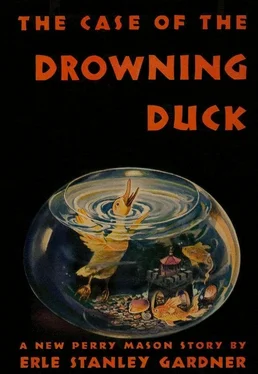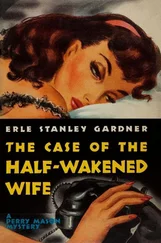“It’s terrible... I want to talk with you. Come on down to my study. Mason, we’re in a terrible predicament.”
“What do you mean?”
“I... hang it, you know as well as I do what I mean.”
“I’m afraid I don’t get you.”
Witherspoon said, “You remember I told you that Marvin Adams had a duck with him when he left here.”
“Yes.”
“That duck was in Milter’s living room in a goldfish bowl.”
“Same duck?” Mason asked.
“Absolutely. I identified it.”
“What’s his name?” the lawyer inquired as Witherspoon led the way down the corridor.
Witherspoon turned with a quick, jerking motion. “The detective?” he asked. “Milter, Leslie L. Milter.”
“No, the duck.”
Witherspoon stopped walking. “What the devil are you talking about?”
“The duck’s name,” Mason said, taking a cigarette calmly from his cigarette case.
“Good God, the duck doesn’t have a name! He’s a young duck. Duck. D-u-c-k. A young bird. A little duckling.”
“I understand,” Mason said.
Witherspoon, apparently under terrific nervous tension, knitted his brows together. There was an angry glint in his eye. “Then what the hell do you mean by asking what the duck’s name was? Ducks don’t have names.”
“You identified him as being the same duck that Marvin Adams took away with him,” Mason pointed out.
Witherspoon thought that over for a moment, then completed his journey down the corridor, and unlocked the door of his den and clicked on the light. Mason snapped a match into flame with a quick motion of his thumb, lit the cigarette, and shook out the flame.
Witherspoon said, “This is a hell of a time to be funny.”
“Isn’t it?” Mason agreed.
Witherspoon’s den was a huge room, furnished with mission-type furniture. There were paintings of bucking horses in action, of cowboys galloping after steers. There were mounted heads on the wall, rifles suspended from pegs, six-shooters in worn, shiny holsters hanging from well-filled cartridge belts. A pottery bowl was filled with rattles cut from rattlesnakes. The walls of the room were knotty pine; and over and around the big fireplace at the far end of the room some of the more famous brands of Western history had been burnt into the wooden wall.
Worried as he was, the old pride of ownership asserted itself. Witherspoon said, “This is where I come when I want to get away from everything. I even have a bunk over there where I can sleep. I’m the only person who has a key to this room. Not even Lois — or the servants — can unlock that door, except when I have someone in here to clean. Those are some very nice Navajo rugs there on the floor. Now sit down, and tell me what the devil you were trying to do about that duck — kid me?”
Witherspoon flung open a cabinet, disclosing a shelf of bottles and glasses. Below the shelf, cunningly concealed behind a door, was an electric icebox.
“Scotch and soda?” he asked.
“Not now,” Mason said.
Witherspoon poured a huge shot of Scotch into a glass, dropped in ice cubes, hissed in soda, and gulped down a good half of the mixture. He sat down heavily in one of the big, rawhide-backed chairs, opened a humidor, took out a cigar, bit the end off nervously, and scraped a match on the underside of the table. His hand was steady enough as he held the flame to the end of the cigar, but the ruddy glow of the match emphasized the network of worry lines about his forehead and eyes.
Mason asked, “Still want to talk about the duck?”
Witherspoon demanded irritably, “What are you getting at?”
Mason said, “Simply that when you identify a duck, you have to know that duck when you see him. There must be something about the duck to enable you to recognize it. There must be something which gives it a personality, something which distinguishes him from all other ducks.”
Witherspoon said, “Don’t be silly. I warned you this thing might happen. That damn kid is a rotter. He’s no good. This is going to be a bitter pill for Lois, but she’ll have to take it. It’s better for her to have it happen this way than after he had become one of the family.”
“The duck?” Mason asked.
“Adams,” Witherspoon shouted at him. “I’m talking about Adams. Lois has no intention of marrying a duck!”
“Did you make any comments to the police about the duck?” Mason inquired.
“Yes.”
“What did you say?”
“I told them it was my duck.”
“Did you tell them how it got there?”
“I told them that young Adams took it off the place with him when he left this evening,” Witherspoon said in surly defiance. “Damn it, Mason, I’m willing to go just so far to protect my daughter’s happiness, but there comes a time when you have to quit kidding yourself. As it is, there hasn’t even been an announcement of an engagement.”
“You think that Marvin Adams murdered this detective?”
“Of course he did.”
“And just what gives you that idea?”
“Do you know what killed him?” Witherspoon asked, his voice rising in excitement. “A neat little experiment in chemistry,” he rushed on, answering his own question. “Milter was out in the kitchen, apparently fixing up a drink of hot buttered rum for himself and his guest. The murderer took a small water pitcher from the cupboard, slipped it on the back of the stove, poured in some hydrochloric acid, said, ‘Well, so long, Leslie, I’ve got to be going now,’ dropped in some cyanide lumps and walked out. The gas burner was going on the stove, heating the water with sugar in it. There were two cups on the cupboard with rum and a chunk of butter in each cup. The sound of the gas jet on the stove prevented Milter from hearing any hissing noise which might have been made by the cyanide dissolving in the hydrochloric acid. The deadly gas filled the room. By the time Milter knew something was wrong, it was too late. He started for the door, and fell over dead. The gas kept burning beneath the aluminum pan in which the sugar and water were being boiled. When the water boiled away, the sugar burned, filled the room with smoke and with a peculiar odor. That’s about all that saved the officer’s life when he looked into the room. The first thing he got was a whiff of the burnt sugar and the burning pan.”
Mason said, “Very, very interesting, as far as it goes.”
“What do you mean by that?”
Mason settled back in the rawhide chair, elevated his feet to a stool, and smiled at Witherspoon. “ Two cups,” he said, “with rum and butter in each.”
“Yes, that’s right.”
“And at the very moment he fell over dead, Milter was heating the water to pour into this mixture.”
“That’s right.”
“Your idea is that the murderer simply placed the pitcher of water on the back of the stove, said, ‘So long, Leslie,’ and dropped in some cyanide.”
“Well, something like that.”
“Don’t you get it?” Mason asked. “If Milter was preparing a drink for two people, the person who dropped the cyanide in the hydrochloric acid must have been the person for whom the second drink was intended. Therefore, he would hardly have said, ‘So long, Leslie,’ and walked out — not while his drink was cooking on the stove. He must have had some excuse other than that.”
Witherspoon frowned through his blue cigar smoke, at the lawyer. “By George, that’s so.”
“And that brings us back to the duck,” Mason said. “Why did you jump at the conclusion this was your particular duck?”
“Because it is my duck. It has to be. You remember I told you young Adams had taken a duck from the ranch when he left — a bit of damned impertinence. I’m going to have to ask Lois about that. She’s got to learn the whole story sooner or later, and she may as well begin now.”
Читать дальше












